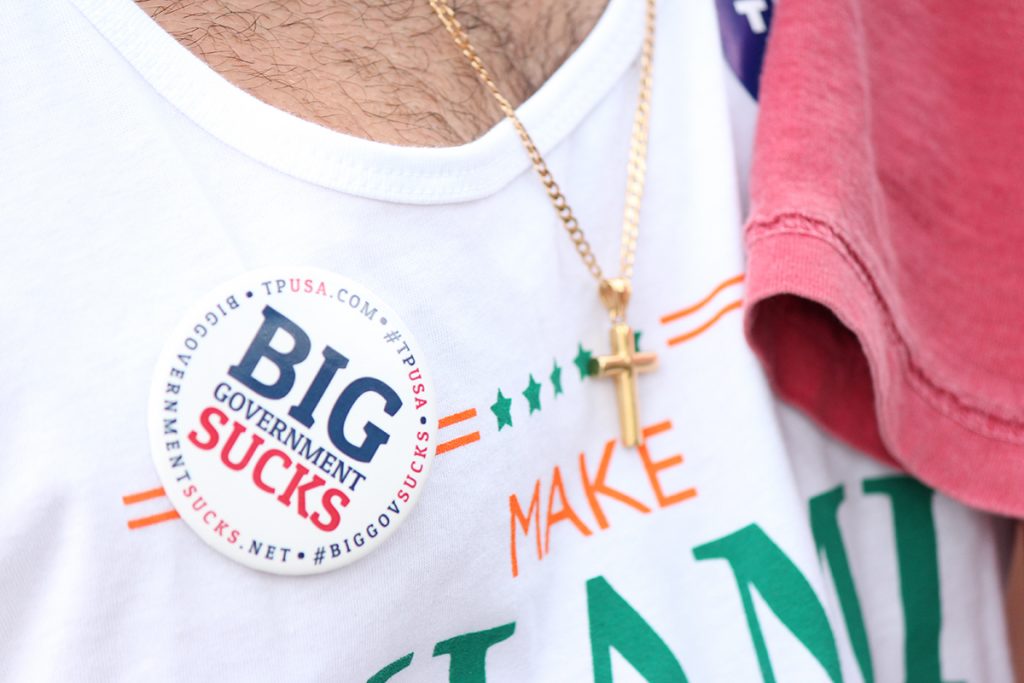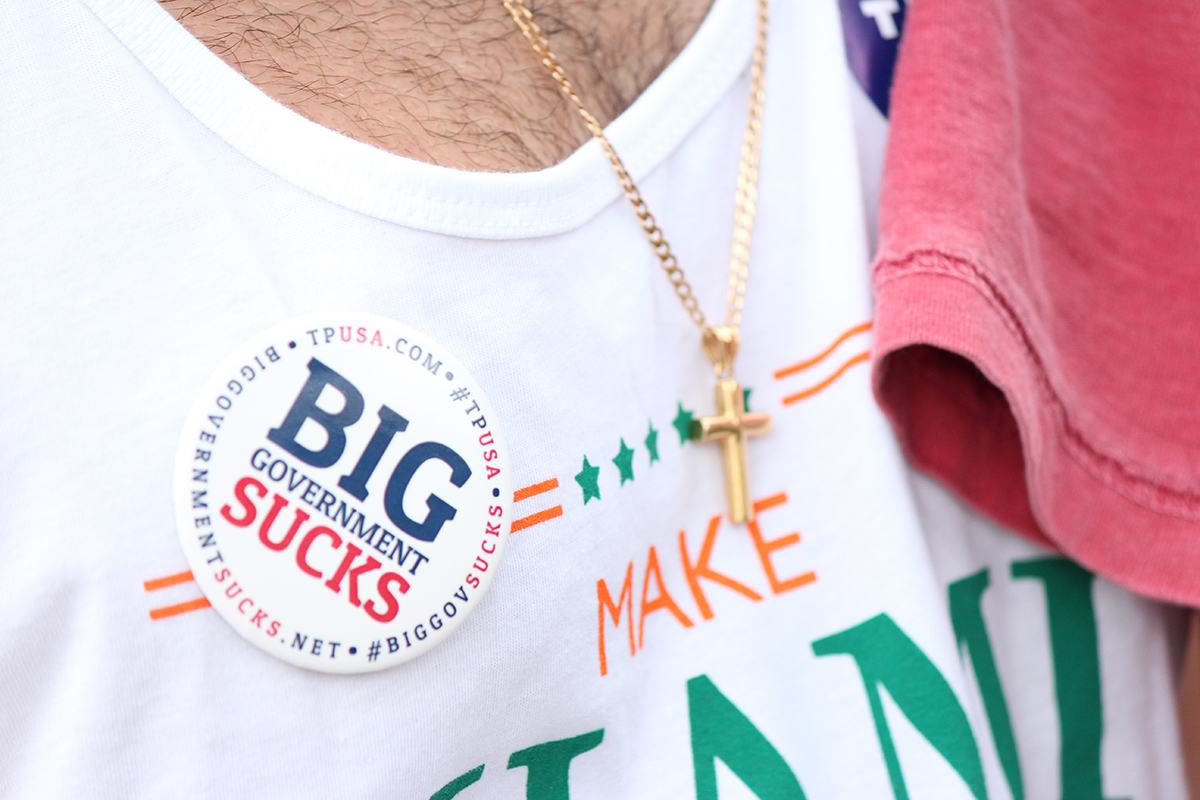
Being an outspoken supporter of Donald Trump requires thick skin. Many view the candidate as not only corrosive, but also directly promoting hate and ignorance. Those who agree with his ideas often face judgment and disapproval from their peers on college campuses.
Emory University was put in the national spotlight in April when pro-Trump chalk messages, such as “Build a Wall,” sparked student protests. In September, a student at Gustavus Adolphus College in Minnesota was verbally assaulted for wearing a “Make America Great Again” cap, according to the school’s College Republicans.
The University of Miami has dealt with similar uneasiness. An on-campus demonstration by Trump supporters in April 2016 drew criticism from a group of students who wrote a letter to President Julio Frenk about their concerns.
Students wrote in the letter that the signs supporters held outside Richter Library – including “Build a Wall,” “Can’t Stump the Trump” and “All Aboard the Trump Train” – demonstrated support of a campaign that has “espoused an egregious rhetoric of blatant racism, xenophobia, misogyny, violence and unadulterated hatred.”
These are just some of examples of opposition that students supporting the Republican candidate face. As a result, students sometimes avoid publicly speaking about their political affiliation.
For Ashley Plotkin, a freshman from New Jersey who supported Florida Senator Marco Rubio in the primary election and supports Trump in the general election, the classroom has become a judgmental environment. Throughout her day, she said she feels as if her classmates are silently criticizing her for being one of few Republicans to speak out about conservative policy positions.
As a political science and economics double major, Plotkin said she feels criticized in her classes when students are “throwing shade.”
Plotkin, who became interested in politics after her father lost his job during the 2008 recession, said one of her classes in particular – “The Election” class – is generally more biased toward Democrats.The lecture course is offered by the university exclusively on presidential years and hosts special political guests every week. According to Plotkin, most of the speakers throughout the semester have been liberal.
“The professors feel like they have 300 students whose opinions they can sway before Election Day and they use that for their advantage,” Plotkin said. “But I hope that people on campus can keep their own opinions, regardless of what their professors are telling them.”
Plotkin said she is standing by her decision to support Trump despite surrounding influences and Trump’s recent controversial actions.
On Oct. 8, The Washington Post released audio recordings of Trump having lewd conversations with former Access Hollywood host Billy Bush. Throughout the audio recording, Trump described encounters with women.
“And when you’re a star, they let you do it … Grab them by the p*ssy,” he said.
The leaked audio resulted in more than two dozen political officials pulling their endorsements from Trump while other party leaders condoned his remarks. Speaker Paul Ryan said he was “sickened” by the audio and uninvited Trump from campaigning alongside him at a scheduled event in Wisconsin later that week.
These comments, multiplied by Trump’s reputation with women, have caused the G.O.P. nominee to struggle with potential female supporters. According to an Oct. 7 Quinnipiac University poll, Democratic opponent Hillary Clinton leads Trump 53 to 33 percent among women.
Plotkin said although she disapproves of Trump’s words in the leaked audio, the inappropriate comments have not swayed her vote.
“I don’t like the politicians that are trying to make it seem like it’s just locker-room banter,” she said. “However, I do think the things Hillary has done against women are 10 times worse than what he said.”
Among the reasons Plotkin said she believes Clinton is worse for women than Trump, is a case when Clinton represented an alleged rapist and, according to Plotkin, said it was the girl’s fault because she “had a thing for older men.”
In 1975, Clinton, a lawyer at the time, was appointed to represent a man charged with raping a 12-year-old girl. The case ended in a plea bargain for the defendant. The 12-year-old girl, now 54, was one of the women at a Trump news conference held ahead of the second presidential debate where a total of four women alleged mistreatment by the Clintons.
Self-described as “somewhat feminist,” Plotkin said she supports many of the ideals the women’s movement strives for, including the eradication of rape culture and the normalization of sexual assault against women, but does not agree with its liberal political views.
Plotkin said the negative responses she’s received for being a Trump supporter were more pointed because she is a woman.
“I find it funny because no one tells men they have to vote a certain way because of their sex organs. Only women are told that we have to vote as Democrats because we are women. I don’t think that’s fair,” she said.
Plotkin said even though there are times during class when it seems others are judging her political views, she tries to find common ground with those who disagree with her.
“People have opinions and they should not be told that they can’t vote for a certain political party because of their color or because of their gender. People talk about equality. I think that’s equality,” she said.

For senior Ben Brotherton, situations like the assault at Gustavus Adolphus College make him uneasy about wearing Trump apparel around a campus he described as “at best, begrudging acceptance or begrudging tolerance.”
Brotherton, a senior management major from St. Louis, Missouri, was raised in a Democratic household and voted for Bernie Sanders in the Democratic primary. After Clinton beat Sanders for the party nomination – amid heavy controversy – Brotherton said he began to understand Trump, a candidate who started off as a joke to him.
As a son of working-class parents, Brotherton said he saw potential in Trump that he hadn’t seen in Clinton or Sanders. Specifically, he said he found Trump’s position on immigration to be one of the most important selling points.
Since the start of his presidential campaign, Trump has been adamant about building a wall across the United States-Mexico border to keep illegal immigrants from entering the country. Brotherton said he believes the plan will help not only Americans but also immigrants living in the United States because the closure of the border would alleviate wage stagnation.
“No way that these people are getting paid what their labor is actually worth,” he said.
Sanders, a self-proclaimed Democratic Socialist whose policy plans included tuition-free public universities and a universal health-care system, was a candidate Brotherton strongly supported through the primary election. However, as the primaries came to a close, Brotherton began to feel the debility of Sanders’ campaign and realized the country needed a strong leader: Trump.
Brotherton said transitioning from being a Sanders supporter to a Trump supporter during one of the most unprecedented general elections has not been easy. He said being a Trump supporter has come with its share of backlash, during which Brotherton tries to remain silent.
In one instance, during a class about advanced organizational behavior, Brotherton said his political views were grouped with those unlike him simply because he supports Trump.
“One of the students in class with me said her doctor, who is Muslim, said he was happy Trump was out here because now he can tell who the racists are,” he said.
After the student finished telling the story, Brotherton said students in the room seemed to agree with what the doctor had said by nodding their heads. Brotherton stayed silent.
“Everyone in the room was like, ‘Yeah, uh huh.’ So before hearing anything I have to say, I’m already racist? Fantastic. Gotta love that,” Brotherton said.
The Republican nominee has been called racist by Clinton supporters and others because of comments he has made about different minority groups, including blacks, Muslims and Latinos. Following the December 2015 terrorist attack in San Bernardino, California that left 14 people dead, Trump announced his proposal to ban all foreign Muslims from entering the United States.
However, Trump’s association with the “racist” label began months earlier, when he announced his bid for presidency on June 16, 2015. During part of his speech, Trump made sweeping comments about illegal immigrants that upset many Hispanic and Latino voters.
“When Mexico sends its people, they’re not sending their best,” he said. “They’re bringing drugs. They’re bringing crime. They’re rapists. And some, I assume, are good people.”
Trump trails Clinton among Latino voters 15 to 74 percent, according to an Oct. 24 poll by Latino Decisions, a firm specializing in Latino community surveys.
David Mejia, a junior born to Cuban and Dominican immigrants, said being a Trump supporter has made being vocal about his political affiliation confrontational both on-campus and online. Mejia said he refrains from talking about politics on campus because whenever he does tell someone that he supports Trump, “it never goes well.”
“They usually start with an argument of hate toward Trump or calling me stupid,” he said.
Mejia said the negativity toward Republican students comes not only from peers but also from professors who make political jokes. Most recently, Mejia said, his economics professor made a joke about Trump and international trade deals. Although he’ll usually laugh if he finds the comments funny, Mejia said partisan quips are not appropriate for the classroom.
“It kind of bashes on students’ opinions and as a teacher, you shouldn’t be doing that. You should support students making their own decisions and opinions based on what they’ve learned in your class,” said Mejia, an economics major.
Gregory Koger, an associate professor of political science who teaches an American presidency course, said the Trump campaign is a challenge for professors to tackle throughout this election because Trump is not a traditional candidate.
“It’s that he’s so far out of the mainstream of American politics. It’s one thing to respect Republicans and Democrats, Liberals and Conservatives — fine,” he said. “It’s another thing to have someone say things that are so demeaning to large segments of the American population and then have to show up in class and act like it’s normal … It’s my job to show up and talk about these two candidates in an impartial and fair way, and that’s difficult.”
According to Mejia, he usually doesn’t vocally react to anti-Trump rhetoric in the classroom and said his own Facebook profile is not safe for him to express his conservative opinions without receiving negative responses.
Mejia said he posted Trump’s tax plan to his page and, within minutes, he was receiving comments from people telling him he was “stupid” and shouldn’t vote for Trump because “it’s dumb.”
“I wasn’t supporting him specifically. I was just sharing his tax plan and people came out, and I had a string of comments about how I could support a racist, a bigot,” he said.
Being a Latino voter, Mejia said Latinos have to understand Trump’s intentions behind sometimes unsavory words and policies.
“They need to actually listen to him and see that he’s actually trying to help the immigrants that are here … because a lot of the illegal immigrants will take the low-wage jobs that minorities have here,” Mejia said.

Liam McGrath, a junior who grew up in a household with a Republican mother and a Democratic father, said he watched both the Black Lives Matter and the Trump demonstrations on campus but was upset that one received a negative response while the other did not. He said both are equally appropriate on a university campus despite the differing viewpoints.
“Both should be outspoken. I support both of them. It made me upset that the Trump supporters and Republicans on campus were attempted to be suppressed for their beliefs,” McGrath said.
Throughout his time supporting Trump, McGrath said he has had interactions with others who project their negative connotations about the candidate onto him. He said he believes people get those associations from what they hear in the media.
“I think the media has portrayed him in a certain negative fashion and that is where people get their negative connotations from,” he said. “And then their negative connotations are automatically put on me if I do say that I support Donald Trump. I don’t like that. It’s an automatic negative connotation and it almost makes me ashamed in some senses to support our Republican candidate right now.”
McGrath said his first experience of being ridiculed for supporting Trump was a year ago, when a classmate asked him who he was voting for. When he answered that he was voting for Trump, McGrath said the classmate accused him of being a racist and a xenophobe – a person with a fear of foreigners.
“That personal interaction is what really opened my eyes. And now, I’d like to see more acceptance of all different beliefs, even third party. I think everyone’s beliefs are important and everyone’s beliefs should be represented,” McGrath said.
McGrath said regardless of who wins the election, he hopes people will stand by their president.
“I support whoever the president is,” McGrath said. “Obviously, I think that Donald Trump should be president of this country but if Hillary Clinton is to win, I’m not going to say anything bad. She’s still going to be the president and she deserves all the support that she should get if she should win — as does Donald Trump.”
The interviews were conducted over the course of several weeks. Follow ups were done the week of publication to ensure the thoughts and opinions of those interviewed had not changed.
The Miami Hurricane requested interviews with more than 25 students who identified as Trump supporters at the university. Of those asked, only four agreed to be interviewed. Those who declined cited distrust in the media and fear of repercussion as their reason for not speaking.






